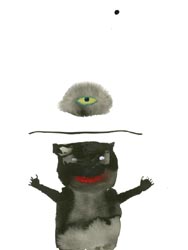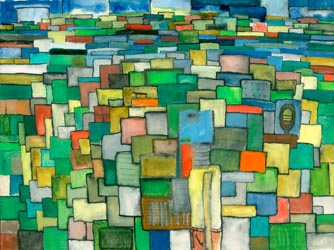John Lurie
 |
 |
| Of Course Animals Have Souls | Man in a Park With Meter |
| Paintings by John Lurie; Photos by Ray Henders | |
Interview by Tim Broun, Part 2
PSF: Correct me if I'm wrong, but this was a while before the first album, right? Wasn't it the more rock-oriented places that gave you a chance to play & grow?
JL: Yeah the jazz clubs would have nothing to do with us. Partly, we were the wrong color but also we were wearing these 1950s suits with gaffers tape holding part of the shoe together. We were pretty untamed.
We didn't record for a long time. Some A&R guy would come into the dressing room, hold out his card and say, "Hello, I am from such and such records ..." And we would all scream in unison, "Get the fuck out!" I wish we had never stopped doing that.
PSF: I always loved the way you guys dressed. How did the EG deal and working with Teo Macero come about?
JL: To be honest, I don't quite remember.
PSF: Do you enjoy the recording process in general? I know you've talked in the past about enjoying touring.
JL: If the record company has allotted 3 days to record and 2 to mix a whole album, then I hate it. You find yourself just trying to not make mistakes, so you get it down, rather than really playing. The 2 best records with the Lizards were Voice of Chunk and Queen of all Ears, because I paid for them myself. I would rather have the great recording than the money. But then, it was always shocking to me how some of the musicians would start complaining, "Oh we already did that song, it's fine." Where fine was not what I was going for and was shocked that they would let something go, where the feel or tempo was not good. I think they saw me as Captain Ahab.
See, I think the last thing the world needs is another CD. So unless it is breathtaking and seamless, there is just no point to making it. Of course, I have never actually accomplished this, but the idea of "oh it's fine," just doesn't work.
PSF: Was it that attitude & vision that contributed to the band becoming "yours"?
JL: No, the other way around, I think.
PSF: Gotcha. Now the early to mid '80's saw you really come into your own, so to speak, as you started working with Jim Jarmusch both on & off screen with all of your scoring work. Was the experience of doing soundtrack work much different than working with the band? After all, the Lounge Lizards always reminded me of music created for a film that hadn't been shot yet.
JL: The early Lounge Lizards were a bit of film noir gone mad. Later, as the band got better and more real, we were not really sounding so film score like. I was very influenced by Morricone, Bernard Herrmann, Nino Rota, John Barry, a lot of film score composers, so that shows. But basically the difference is that with a film, you are working on a project and there are many things to take into consideration - the film itself and how the music effects it being the most important, but there is the timing, the politics, the arc of the film... With the band what I was concerned with was much less earth bound.
PSF: How did you like acting? Was that something you had been wanting to do or did it just sort of happen? Acting just sort of came to me. Only on rare occasions did I like it. In most cases, it is just not a creative thing to do.
PSF: Did you enjoy the process of making an unscripted TV show (Fishing With John)?
JL: Yes, shooting those, at least on the ones where the crew was good, was wonderful. Some of the best moments of my life. In a boat with Dennis Hopper in Thailand, with the sun going down and that breeze hitting your body.
PSF: How does it feel to be something of a forerunner in the world of reality TV?
JL: I think it feels exactly the same as if I hadn't been.
PSF: Did you keep on painting throughout the '80's while you were busy with the band & movie work?
JL: Yeah, painted a lot in the '80's and then a little into the nineties, but then when I was running the record label and doing film scores, I just sort of lost contact with it because I was so busy.
PSF: Why such a long gap between Voice of Chunk and Queen of All Ears (10 years)?
JL: Long gap, well, we couldn't get a deal, we did do those 2 live records in Germany but that was a disaster. It is insane (that) we couldn't get a deal. Anywhere we played, we would sell out. We could be playing somewhere - let's say Milan and Patti Smith and Wynton Marsalis would be playing on the same night - we would sell out a 4000 seat venue and their shows would be half full.
Then we made the mistake of signing with Davey "the artist" Byrne's label and oh I can't even think about these things because it is very upsetting. So the records were so few and far between because they are expensive to make - 9 piece band that has to play live and I didn't have that much money.
PSF: When did you start the label (Strange & Beautiful)? Was it partially borne of the opportunity to control your own releases?
JL: My complaints about the music business can only really properly be expressed in book form, so I am writing a book about it, entitled What do you know about music, you're not a lawyer? Started the label in 1998.
PSF: I'll look forward to that book - you already know how much I love the title. Out of all of the touring that you guys did over the years, were there ever any strange situations you got into or were you ever booked on any completely inappropriate bills?
JL: Yes, a lot, but the one that comes to mind first was that Martin Meissonier, who was Fela's manager and used to do our tours in Europe, was asked to provide a band for his brother's veterinary banquet at this fancy ballroom in Deuxville. I guess Martin wasn't that close to his brother and sent us, and this was 1981 so we were really more a punk jazz band than anything else. We looked through the curtain and saw all these middle aged people in tuxedos and just thought, "oh no, this is a mistake."
So we tried. We really tried. We did a soft blues and then something else with all the raucous parts taken out. But within ten minutes of us starting, they had all neatly folded their napkins and left the tables. We continued to play the rest of the concert in this beautiful ballroom, all by ourselves.
PSF: What did you like about touring so much?
JL: Just the moving forward in unison, like a small army that couldn't be stifled. Against all odds, we will prevail by bringing this beautiful, unusual energy to your town. We loved each other, or often we did and we would rise up and do this thing. And of course there were the girls. Many, many beautiful girls.
PSF: Do you want to discuss your illness?
JL: I am not shy to discuss my illness, not sure it is something people want to read about.
PSF: We don't have to discuss it at length, but it's good for people to know I think. You've described as some sort of Advanced Lyme Disease, right? And it's pretty much prevented you from going out & playing music?
JL: It took me a long time to find out for certain but yes I have Advanced Lyme. It leads to an enormous amount of weird, migrating neurological problems that can be mild or severe depending on the week, day or hour.
PSF: This has lead to you painting or running the label pretty much full time, right?
JL: It has led to painting full time. The label with the help of Mr. Patrick Dillett, I try to keep afloat. I am also selling my prints on line, you have probably seen them- they are the ones with the children with very large eyes.
PSF: You've recently had a couple of somewhat high profile art shows, right? Can you tell me about them...how did they go?
JL: My show at PS1 came down last week. Was up all summer. It's a museum so they were not for sale, so how did they go is hard to answer. That it happened at all is fairly wonderful. PS1 usually has really great work in a world where there is an enormous amount of crap. Got good reviews, but that isn't a way to judge how something went.
PSF: A lot of it is the press/reviews generated and being in PS1, that's almost the Museum of Modern Art! That's excellent! What's next for you - are there any art shows? You mention the book you're working on. Tell me what to look for from John Lurie Enterprises.
JL: We are doing a show at Lelong Gallery in Zurich in November. Started selling prints on line - which are beautiful. Have a book of black and white drawings called Learn To Draw, Volume One. When that book is coming out in the US is apparently a secret but it should be this fall.
PSF: At one point wasn't there also a book of memoirs planned from you?
JL: I am 3/4 finished writing my memoirs. I was fairly certain that I didn't have much more than a year to live, so I was writing in a hurry. I wrote 40 chapters and then for a long time because of what was happening to my brain, I couldn't write. I would get half way through a sentence and have no idea what I intended to say. I was losing words. And my motor control problems were wreaking havoc with the typing. I know that everyone has that thing where they are half way through a sentence and not know what they are writing and everyone loses words and names. But not like this, I promise you. Not like this. I would sit there clamping my head, trying to make it work. But, I had no choice but to stop writing.
PSF: Tell me about the origins of Marvin Pontiac. Did recording under a different name allow you to do things you otherwise wouldn't feel okay about doing?
JL: I was just shy to sing, so I needed a mask. I sing no good.
PSF: How were the reviews?
JL: They were good. There were a few journalists who were duped by the hoax and they were angry. Mostly white guys saying it was wrong to pretend to be black, but I found out that two of them had done these rave reviews on it until their magazines told them that it was me and that it wouldn't be credible to run their article about the insane African bluesman who had been rediscovered. But that shouldn't have changed their opinion of the music.
PSF: Wow, that's stupid. You're right - it is the actual music that's important, isn't it? Tell me about the 'Best of' you're planning and when it might be released.
JL: It is a vague plan at the moment.
Nusrat Fateh Ali Khan
Ali Farka Toure
Astor Piazzolla
Jimi Hendrix
John Coltrane
Igor Stravinsky
Duke Ellington
Nirvana
Beatles
Charles Mingus
Ravi Shankar
Eric Dolphy
Sidney Bechet
Little Walter Jacobs
Oumo Sangare
the Shaggs